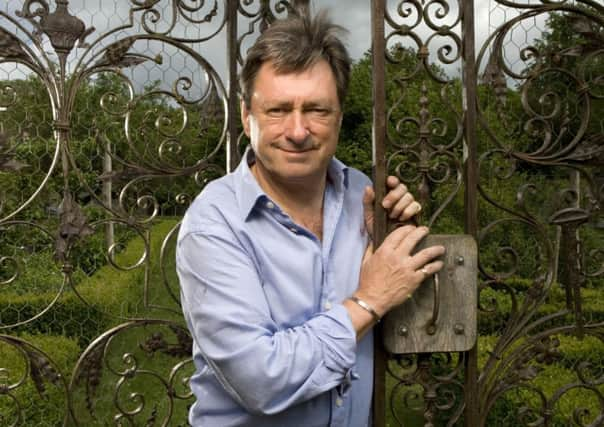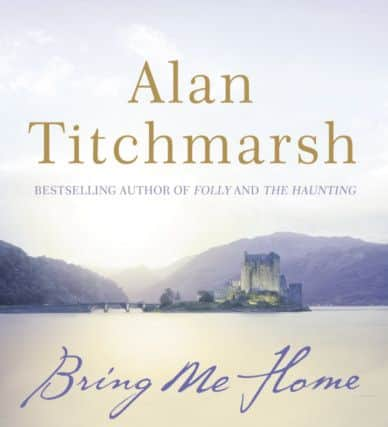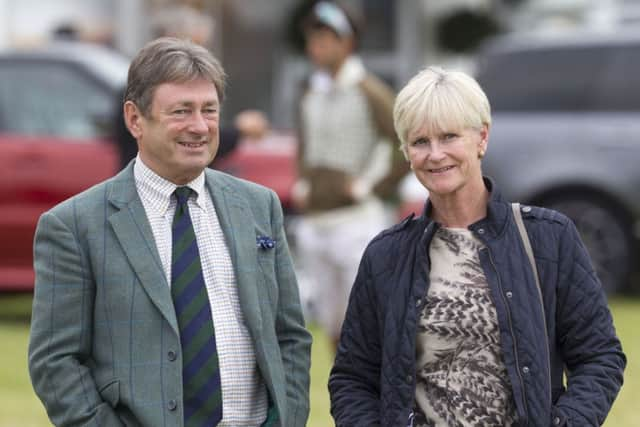Alan Titchmarsh on his love affair with Scotland


His waxwork in Madame Tussauds has to be scrubbed of lipstick twice a week, his daytime TV show has been running since 2007 and every one of his seven novels has made the Sunday Times bestseller list. He has an MBE, the Victoria Medal of Honour, that’s the top gong from the Royal Horticultural Society to you and me, and when it comes to gardening, this man really knows his onions.
“People say ‘you’re on everything’,” he says. “I’m not. They don’t know what I’ve turned down!”
Like what?


Advertisement
Hide Ad“I’d never do reality TV. I couldn’t survive watching people pick fluff out of their navels and whingeing. You see people doing toe-curling things on TV and think, ‘don’t do that!’ I don’t think people should necessarily find you interesting unless you’re doing something. I’d rather give them a reason to watch. You hope you’re interesting. Fame is just a by-product, not a goal.”
As we chat in a break before he goes on air to present The Alan Titchmarsh Show, with guests Britain’s Got Talent winners Ashleigh and Pudsey and Man versus Food presenter Adam Richman, he is brimming with enthusiasm.
“Ashleigh and Pudsey are in the green room. They’re doing a feature film, but he’s not a prima donna. He’s very well behaved,” he laughs.
Titchmarsh has an easy manner, informal and approachable and likes chatting to people, and animals, which may well be the secret of his popularity with the nation’s viewers. Starting out as a gardens expert and moving mainstream, his TV hits include British Isles: A Natural History, How to be a Gardener, Ground Force, which pulled in 12 million viewers at its peak, and Gardeners’ World. His daily Alan Titchmarsh Show has clocked up 700 editions since 2007, and although this season, which ends in September, will be the last, he will continue to present Love Your Garden and is expected to front Britain’s Best Garden for ITV.


“I’ve always been a bit of a chatterbox,” he chatters. “My school reports said things like ‘Alan has very good intentions. It’s a shame that they’re not always fulfilled,’” he says, his native Yorkshire tones only slightly modulated by his years “doing missionary work in Hampshire” where he lives with his wife Alison, and various dogs and cats.
“I like interviewing anybody who’s a really good talker and not a lot of hard work. The ones who know what they are there to do which is not just answer questions, but entertain. Julie Walters is a great giver, for example. I love her. And I’ve always wanted to do Maggie Smith. She’s the one that got away. But the monosyllabic ones are difficult, you have to work overtime. One or two are there because it’s in the contract and they have to be there. You feel like saying, look, don’t come if you don’t want to do it!” he says.
Advertisement
Hide AdBorn in Ilkley to Bessie, a textile mill worker and Alan senior, a plumber, in 1949, young Alan was always outdoors and his father was delighted when his son grew green fingers.
“I always loved being outside and the garden was the nearest bit of outside. I sowed some tomato seeds when I was about eight and when they grew, that was it. My father was a plumber and a part-time fireman and did everything: made cupboards, put in central heating systems, but he didn’t like gardening. I was happy about that because it made it mine. He was happy too and made me weed for a penny a bucket.”
At least he paid.
“Yes, but they were very big buckets!”
Advertisement
Hide AdAt 15 Titchmarsh left school to work in a local nursery in Ilkley, also attending horticultural college, then moved south to the Royal Botanic Gardens at Kew. From there he became a horticultural journalist, editing gardening magazines, then a freelance broadcaster and writer. Now, with 40 gardening books to his name, he writes regular newspaper and magazine columns, and has written three volumes of memoirs to sit on the shelf alongside the novels.
No matter how successful the writing or TV work, he’s never far from his greenhouse, shed or polytunnels. “I have all of those in my garden. It’s four acres and I walk round it every day before I come to work because that’s where I belong. Gardening is my stock in trade and I will never give up. That’s my bedrock. I’m lucky to be able to do it. That’s a big part of me, watching, creating things,” he says. “I like the contrast with TV.”
Titchmarsh puts his success down to his can-do attitude, his willingness to think ‘why not? I’ll give it a go’ whenever asked, rather than a burning ambition or life plan.
“I’ve had more opportunities presented than I ever imagined,” he says. “I believe you have to go where life nudges you and my yardstick has always been have a go, and can I do it without embarrassing people? Apart from your children that is, it’s your job to embarrass them. You just carry on where you are. I’m just grateful to be employed in interesting things.”
“I’ll do the rest of this series of the afternoon show, then TV will probably slither away as things start to fall off me. But writing you can always do as long as you have your marbles. I like the contrast between the sociability of TV and the complete solitude of sitting writing.”
Tichmarsh has two daughters, Polly, 35, and Camilla, 33, with his wife, Alison, whom he married in 1975. The pair met at an operatic society – “she was dancing and I was singing. She still teaches dancing, and I still sing. I was a choir boy, and a bellringer. Religious, but in a quiet way.”
Advertisement
Hide AdDespite the longevity of his marriage, or perhaps because of it, Titchmarsh is something of a sex symbol. Voted the world’s second sexiest man in 2000 (he was beaten by George Clooney), the twinkle-eyed gap-toothed priapus of the potting shed thinks he knows why the ladies like him.
“I’m popular with women because I’m unthreatening,” he says. “I’ve slipped a bit since that list, I’m sure. My wife just raises an eyebrow about the sex symbol thing and doesn’t say anything. She’s a proper wife, keeps my feet firmly planted.”
Advertisement
Hide AdNot that Titchmarsh is averse to a little flirtation. Ask him what he would be were he a plant and he comes back straight away with “a sweet pea. Quite good up against a wall – and perfumed.”
It’s the self-deprecation of ‘quite’ that saves him from oleaginousness, and the non-alpha male ‘perfumed’, that makes you laugh.
The only blot on Titchmarsh’s horizon is his being dropped from this year’s BBC’s Chelsea Flower Show coverage after 30 years, to be replaced by Sophie Raworth.
“Yes, I’m sad about that but nothing is guaranteed in life,” he says.
“But Sophie Raworth isn’t a gardener like you,” I say. “What does she know about plants?”
“To quote Francis Urquhart [from House of Cards], you might well think that; I couldn’t possibly comment. But thank you for that.”
A pause.
“I may be at Chelsea anyway,” he says, bouncing back.
What doing?
“I can’t say at the moment,” he says mysteriously.
Advertisement
Hide AdAs it turns out, he’s been invited to design the Royal Horticultural Society’s Britain in Bloom 50th anniversary garden.
In the meantime he will also be thinking about his ninth book, the decks being cleared with the publication of number eight, Bring Me Home, this week.
Advertisement
Hide AdWith all of his success in other fields, not to mention being patron or president of more than 35 charities and organisations, why does Titchmarsh feel driven to write novels too?
“Why not?” he says, reasonably. “I just like telling stories. I’d always written anyway. I’ve been a gardening writer since 1974 and done factual books, then in 1988 I thought I’d stick my head above the parapet and write a novel because I enjoyed creative writing at school,” he says.
Bring Me Home is the first of his novels set in Scotland. The story of Charlie Stuart, his struggle to keep Sodhail castle and his family going and what happens when the past catches up with them, it evokes a Scotland of benevolent landowners, faithful retainers and stunning scenery. There’s tragedy and humour, and there’s also sex, although less than in previous Titchmarsh novels. In fact, one of the sex scenes in my proof copy, no longer appears in the finished version. It doesn’t make the cut. Aw.
“Yes, the sex scenes have got fewer ever since I started to do the audio books. Because when you do the audio books you have to read it out,” he squirms. “That’s made me much more careful.”
“I always set my novels in places I know and am fond of: the Isle of Wight, Devon, Hampshire, and I hadn’t done Scotland. I love Scotland. The grandeur of the Highlands is amazing. People talk about the Alps and the Pyrenees. I say, have you been to the north of Scotland? My parents took me all the way up to Durness when I was 16 and that was amazing too. I’m a Britophile. I’m attached to the land and the landscape and it’s very important to me.”
This latest novel took Titchmarsh six months to write and he describes it as an intense process, that he enjoys as a contrast to his “sociable” TV work.
Advertisement
Hide Ad“You have to do it every day, especially towards the end. And you have to be on your own to write. When you’re writing it, you have to live it, you have to be in that moment. I often sit writing in floods of tears. It’s harrowing.”
Titchmarsh admits he’s in touch with his feminine side, and is happy to reveal his sensitivity, which is possibly another thing that makes women warm to him.
Advertisement
Hide Ad“The kids have a competition at Christmas to see who can move me to tears fastest with their presents. They give me meaningful gifts, not necessarily expensive, but touching. I can’t help it. It doesn’t take long. I also cry at TV programmes. Call the Midwife makes me cry every time.”
Bring Me Home doesn’t spare readers with a sentimental bent as heartache and tragedy await our doughty hero Charlie Stuart.
“The hero is always me. I make my leading man relatively sensitive with lashings of common sense. They’re not all the same, but they’re aspects of myself. I like exploring ordinary folk in extraordinary situations. The other characters are not people I know, they’re types I know. Women who’ve had too many gins and too much sun, I’ve seen that,” he says.
“The plots are a voyage of discovery for me as I go along. I only stop writing when I know where it’s going next time, then I go and do a bit of gardening and thoughts come in. You sometimes wonder where it comes from. It doesn’t do to analyse them.”
“It’s great fun, writing, but it’s hard work. The agony and the ecstasy of the writer! Then when they get on the bestseller list you feel vindicated and think, I will be allowed to write another. I don’t take it for granted. It could all end tomorrow,” he says.
Somehow, I think that’s unlikely.
Bring Me Home is published by Hodder & Stoughton, £18.99